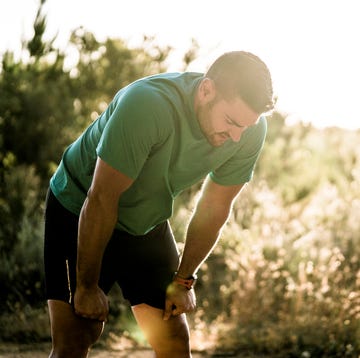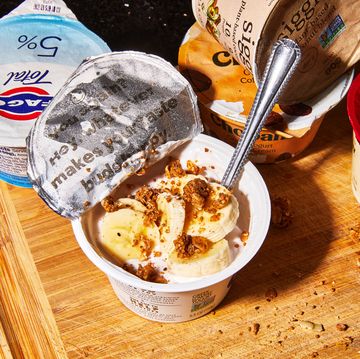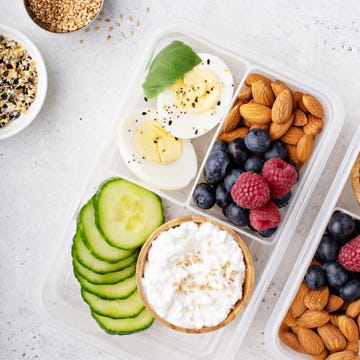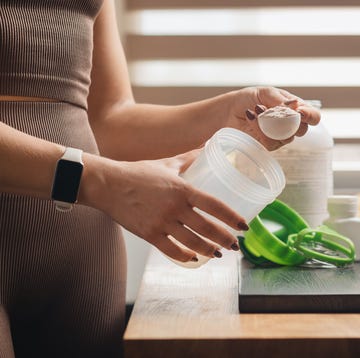Health - Injuries Heather is the former food and nutrition editor for—fruit bears, berry-flavored fish, sour kids—and taste-tested one piece from each, skeptically. The label boasted just 3 grams of sugar. The whole bag? Not more than 90 calories.
As I’ve written before, I no longer jump on the diet bandwagon. High-Protein Snacks for Runners DAA Industry Opt Out. So when I read the ingredients list on the gummy packages and saw “stevia,” I hung my head.
I’ve tried foods sweetened with stevia before and have always disliked the weird taste. There’s just something about that “fake” sweet flavor that stands out. And while this sweetener may have zero calories, I was hesitant to eat anything that wasn’t real sugar. Too good to be true, right? Almost always.
The Runners World Vegetarian Cookbook good. Over the course of a few weeks, I made my way through eight bags—two of each variety. With every bite of mostly sugar-free tastiness, I thought, “There’s no way stevia is good for me.”
Or is it harmless? I turned to the experts to find out.
What Is Stevia, Anyway?
Unlike other zero-calorie sweeteners—sucralose, aspartame, saccharin—stevia is not artificial. It’s a plant named stevia rebaudiana (sometimes known as candy leaf or sweet leaf) thus making it a natural sweetener. Stevia leaves are about 200 to 300 times sweeter than sugar, which means you need very little to sweeten a food or drink.
The stevia used in food products is actually stevia leaf extract, explains Lisa Lefferts, M.S.P.H, senior scientist for the Center for Science in the Public Interest (CSPI). “Stevia leaf and crude stevia extracts are not permitted as sweeteners,” she says. Research found that high doses of whole-leaf stevia and crude extracts fed to rats reduced sperm production and rapid cell growth in their testicles, which could cause infertility or other problems, a report from CSPI says.
How Healthy Is Stevia?
So is it any better for you than sugar? Well, there isn’t a cut-and-dried answer here. Shoes & Gear. Americans consume almost 152 pounds of sugar per year, according to the Department of Health and Human Services. And the U.S. Dietary Guidelines recommend consuming no more than 10 percent of calories from sugar. That’s about 13 teaspoons per day. The current average is 42 teaspoons.
A diet high in added sugar—sugar that is not naturally found in a food such as milk’s lactose or fruit’s fructose—is linked to negative health effects, including obesity, type 2 diabetes, tooth decay, and metabolic syndrome, Lefferts says.
So you’d think that cutting out sugar and opting for a zero-calorie sweetener like stevia is the way to go, right? Lefferts says that it depends on how much sugar you consume. “Small amounts of sugar are perfectly safe.” But if your sweet tooth gets the best of you, a sugar alternative may be a good solution.
“Stevia leaf extract is safer than many other sugar substitutes, especially aspartame and sucralose,” Lefferts says. Research has Is Honey Better for You Than Sugar.
That said, there is still a need for more research around stevia. “In a perfect world, it would be better studied, especially since some short-term tests raised some red flags, but it still earned the CSPI ‘safe’ rating,” says Lefferts.
We may earn commission from links on this page, but we only recommend products we back Natalie Rizzo, M.S., R.D., point out that if you’re consuming so much sugar you’re relying on zero-calorie sweeteners, you’re better off cutting back on sugar in general. “If I’m working with someone who eats way too much sugar, I want to get them to eat more fruit and natural sugar instead of added sugars first before going to a sweetener like stevia,” Rizzo says.
Lefferts agrees that eating whole fruit, despite its natural sugar content, is more nutritious and may even help you satisfy your sweet tooth. She also adds that sugar substitutes can be a good way to cut back, but suggests choosing options that are considered safe, including stevia leaf extract and erythritol.
[As Ive written before Eat for Abs.]
But Don’t Runners Need More Sugar?
It’s true. Runners who log long and hard miles generally have a little more wiggle room when it comes to eating simple sugars (think: white breads, pasta, or candy) because they need to restock their muscle’s glycogen stores, Rizzo says.
“There’s a fine line in the running community when it comes to how much sugar is necessary for runners because it’s their main fuel source,” she says, pointing out that you can DAA Industry Opt Out.
“But added sugar is somewhat necessary for long runs and during marathon training,” Rizzo says. Runners rely on the sugars added to training essentials such as sports drinks, gummies, and gels. And Rizzo points out that if you choose stevia, “it’s not going to give you the necessary sugar that your muscles need to power through these types of workouts.”
The Bottom Line
There are a handful of zero-calorie sweeteners, like stevia and monk fruit (which still needs more research, Lefferts says), that are considered safe based on the scientific evidence available. But Lefferts and Rizzo point out that many studies are small, and these products are still fairly new, so we’re still learning about long-term effects.
If you consume more sugar than recommended, sugar substitutes might be good options to consider. However, you’d be better off cutting back on sugar and choosing whole fruit or less-processed sugars such as honey and maple syrup. (But remember, honey and syrup are still sugars!)
“Everyone has different goals and lifestyles, so it’s hard to say ‘Never have stevia,’” Rizzo says. It depends more on the whole picture of your diet, activity levels, and personal goals. If you’re in doubt, work with a professional, doctor, or nutritionist to analyze your current diet and find places to make healthier changes for your personal lifestyle.
Heather is the former food and nutrition editor for Runner’s World, the author of The Runner’s World Vegetarian Cookbook, and a nine-time marathoner with a best of 3:23. She’s also proud of her 19:40 5K and 5:33 mile. Heather is an RRCA certified run coach.













